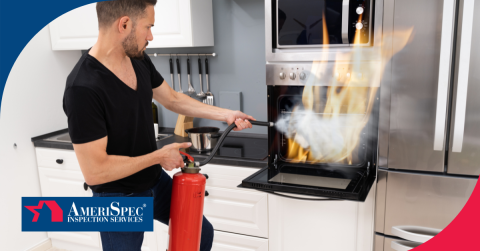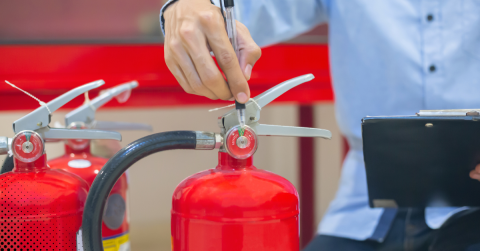
Fire Safety Month is observed in October each year. October 9 is designated Fire Prevention Week in the United States to commemorate the Great Chicago Fire of 1871. It serves as a reminder to practice fire safety and prevention at home and in the community.
Electrical fires threaten homes annually, causing substantial property damage and endangering lives. Homeowners can substantially reduce these risks by proactively inspecting and maintaining their electrical systems. This article will help you understand the crucial steps for a thorough electrical system inspection and provide you with preventive measures to enhance your home's safety.
Inspection Steps For Enhanced Electrical Safety
Examine Wiring Regularly
Regularly inspect your home's wiring for any signs of damage. Look for frayed cords, exposed wires, or overloaded circuits, common causes of electrical fires. Promptly replace any damaged wiring to prevent potential hazards. If you are unsure about the condition of your wiring, consult a professional electrician for a detailed assessment, which might be a good idea depending on the age of your home.
Assess Outlets and Switches
Malfunctioning outlets and switches can indicate underlying electrical issues. Use a tester to ensure they are powered and grounded correctly, safeguarding against electrical shocks. If you notice any unusual heat, discoloration, or buzzing sounds from your outlets or switches, it’s essential to address these issues immediately. Replacing faulty outlets and switches can prevent serious electrical hazards.
Evaluate Circuit Breakers and Fuses
Old or malfunctioning circuit breakers and fuses can overload your electrical system. Ensure they are functional and replace them as needed to maintain electrical integrity. It’s crucial to know the location of your circuit breaker panel and understand how to reset a breaker if it trips. Regular maintenance of your breakers and fuses helps prevent electrical fires caused by overloading circuits.
Verify Alarm Systems’ Effectiveness
Make sure your smoke and carbon monoxide detectors are fully operational. Conduct monthly tests and replace the batteries annually to ensure they function correctly in emergencies. Installing interconnected smoke alarms ensures that when one alarm sounds, they all do, providing a comprehensive alert system. Additionally, consider adding a fire extinguisher in key areas like the kitchen and garage for extra safety.
Consult a Professional
Especially for older homes, consider seeking a licensed electrician's expertise for a detailed inspection. A professional can identify and address underlying issues, enhancing your safety. A professional electrical inspection should include checking for outdated wiring, assessing the capacity of your electrical system, and ensuring all installations meet current safety standards. Regular professional evaluations can prevent small issues from becoming major hazards.
These steps will improve your electrical system’s safety, significantly reducing fire hazards.

Embrace Preventive Measures
Avoid Circuit Overloads
Circuit overloads occur when too many devices are plugged into a single outlet or circuit, leading to overheating and potential fires. Distribute electrical devices evenly across multiple outlets and circuits. Use power strips with surge protectors to manage multiple devices safely and unplug appliances when not in use to reduce the load on your circuits.
Handle Electrical Appliances with Care
Proper handling of electrical appliances is crucial for fire prevention. Avoid using damaged appliances and always follow the manufacturer’s instructions for use. Keep electrical devices away from water sources to prevent short circuits, and never run cords under carpets or rugs where they can overheat or become damaged.
Follow Established Safety Protocols
Adhering to established electrical safety protocols can significantly reduce the risk of fires. Avoid DIY electrical work unless you are knowledgeable and confident in your abilities. When in doubt, always hire a licensed electrician. Keep flammable materials away from electrical outlets and appliances, and educate your family members on the importance of electrical safety.
FAQs
What indicates electrical issues in homes? Indicators include flickering lights, buzzing sounds, a burnt odor, and frequently tripping circuit breakers. If you notice any of these signs, you must take immediate action to identify and resolve the underlying issue.
How often should electrical systems be inspected? Homeowners should inspect their systems every 3-5 years. However, annual professional evaluations are recommended for optimal safety. Regular inspections help catch potential problems early and ensure your electrical system remains in good working order.
Can homeowners conduct inspections? Essential DIY inspections are possible, but for a comprehensive assessment, professional involvement ensures detailed scrutiny and issue remediation. While homeowners can handle simple tasks like checking outlets and replacing batteries in smoke detectors, a licensed electrician should perform more complex inspections and repairs.
Secure Your Home Against Electrical Fires
Electrical fires pose a serious threat to your home and family. If you want to secure your home in all ways, schedule a professional maintenance home inspection today. Early identification of issues can prevent costly and dangerous incidents.
October is Fire Safety Month, and it's the perfect time to take a few simple steps to protect your home. Check your wiring, outlets, and smoke detectors to make sure everything is in good shape. Avoid overloading outlets; if you haven’t done so in a while, test your smoke alarms. Consider getting a professional home inspection Barrie ON to spot any potential risks for extra peace of mind. Stay safe and fire-smart this month!
When you want to protect what matters most - Contact us today to schedule your own home maintenance inspection at (705) 722-5876 or Click Here to Schedule Now.